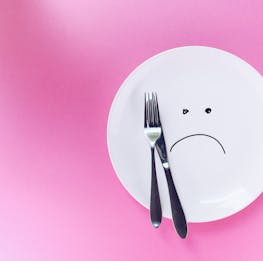The Fast Diet Summary
Lose Weight, Stay Healthy, and Live Longer with the Simple Secret of Intermittent Fasting
You’ve probably heard some acquaintance, work colleague, family member or friend, talking about fasting. If you’re thinking about trying fasting, but need some advice, then Dr. Mosley and Mimi Spencer have done the groundwork for you.
The Fast Diet provides cutting-edge research about weight loss, disease resistance, and longevity. Also known as the 5:2 diet, the diet is examined in this go-to guide that's based on personal experience. The basic premise is to eat normally for five days, and then fast for the other two by restricting calories to 500-600.
Authors Dr. Michael Mosley, and journalist Mimi Spencer, were initially skeptical, believing that fasting was just another fad that seemed complicated and drastic. Furthermore, both felt that dieting is often doomed to fail; however, they now testify to its remarkable potential, after trying fasting for themselves.
They co-wrote this book to make this way of eating - or rather, not eating - easy to digest and implement. For the skeptics, Mosley explains the science of fasting. For the slightly apprehensive, Spencer offers a practical guide on how to fast safely, effectively, and in a sustainable way, so that instead of dieting, we change our lifestyle.
This summary briefly guides us through the simple Fast Diet plan. The idea is to eat normally for five days of the week, and then restrict calories on the other two days. Soon you’ll begin noticing how the mind, body, and health shifts. The reason for these changes is that time-restricted eating isn't just about weight loss; it's about health gains. For example, intermittent fasting plays a significant role in preventing diseases like cancer, and can be beneficial for inflammatory conditions like asthma and eczema. It's also shown to boost mood and memory. Weight loss, as a result, can be viewed as a pleasant side dish.
A word of caution from the authors, though. The information in the book is for general purposes only. For anyone with underlying health problems or doubts about the authors' suggestions, their advice is to consult a qualified medical, dietary, or other appropriate professional. Fasting also isn’t recommended for women trying to fall pregnant or for children.
Examining Attitudes and Beliefs About Food
Let's start with some facts. Fasting for short periods is good for us. However, prolonged fasting isn't healthy, unless it's for a specific health reason, which would require close medical supervision. While fasting, we can still hit the gym, and the latest scientific research shows that fasting, combined with exercise, particularly high-intensity training, is actually good for you. Fasting is also easier than we think, because it's not about what to eat, but when to eat. It's also important to note that we don't stop eating altogether; rather, we just restrict calorie intake. What's more, we can still enjoy a light breakfast and dinner on the two fasting days of the week, which can be any two days we choose.
There are many perceptions and misconceptions about fasting. There are those who see fasting as unhealthy or eccentric, and others who believe that eating a little and often, is the answer, because it boosts metabolism and prevents us from gorging on junk food. Some advocate only eating low-fat foods, or restricting carbohydrates. But is this the answer to weight loss? Despite all of these suggestions, obesity still prevails.
What's the reason for the obesity epidemic? Some believe that it's because we're eating when we don't actually need to. If we look at how we were eating 30 years ago, we eat around 180 calories a day because of snacking. A lot of these snacks come in the form of beverages like milky or fizzy drinks, as well as smoothies. Furthermore, we also eat more at our regular mealtimes, by an average of 120 calories per day.
It's been found that snacking leads to eating more, not less, and snacking doesn't ward off hunger. In fact, the opposite seems to apply. This was supported in a study where volunteers with Type 2 diabetes were divided into two groups. Both groups had to consume the same number of calories, totaling 1700 per day. These 1700 calories had to be consumed, in either two or six meals per day, depending on the group. The results showed that despite eating the same number of calories, the two meals a day group lost, on average, 1.4kg more than the snackers, and about 1.5 inches more around their waistlines. And contrary to what we might expect, the participants eating their calories spread out over six meals a day, felt hungrier than those sticking to the two meals a day plan.
Going Hungry is Okay
Going hungry for a little while isn't anything new, nor is it a bad idea. What a lot of us don't know is that our bodies are designed to fast. Our ancestors fasted, because food was scarce, and the idea of feast or famine was the norm. Fasting has also been practiced for centuries by different faith traditions, such as Lent, Yom Kippur, and Ramadan. According to Saint Nikolai, 'Gluttony makes a man gloomy and fearful, but fasting makes him joyful and courageous.' Apart from the evolutionary, and faith perspectives, fasting can also put us in touch with ourselves.
Mosley argues that in modern Western society, many of us rarely experience hunger, and we're dissatisfied with our weight, our bodies, and our health. When it comes to taking care of our health, we need to keep in mind that the new and ongoing research in nutrition and medicine, continually challenges us to validate, or negate our previous assumptions. And researchers are only just beginning to discover how powerful fasting can be, as a health tool.
What the Research Says
Two researchers, Professor Valter Longo and Professor Mark Mattison, feature prominently, and have conducted extensive research on the human diet. Prof Longo is the Director of the University of Southern California's Longevity Institute. He explores the positive role that fasting plays in aging well, and how it helps ward off age-related diseases, like cancer and diabetes. Mark Mattison, a neuroscience professor, has studied the effects of fasting on the brain, how it reduces inflammatory conditions and enhances cognition, memory, mood, and well-being.
According to Professor Longo, going without food for even relatively short periods, switches on our repair genes. Switching on these genes when fasting, gives the pancreas a rest. This, in turn, boosts the effectiveness of the insulin produced in response to elevated blood glucose. And increased insulin effectiveness reduces the risk of obesity, diabetes, heart disease, and cognitive decline. Fasting also regulates a hormone called IGF-1, which stands for Insulin-Like Growth Factor 1. As the name implies, this hormone has growth-promoting effects on almost every cell in our bodies. We need adequate levels of IGF-1, and other growth factors, when we're young and growing, but high levels later in life appear to lead to accelerated aging and cancer. A reduction in IGF-1, means reducing our risk of contracting some age-related diseases like cancer. As Professor Longo explains: 'it's like driving a car with one's foot flat down on the accelerator, pushing it to perform all the time. Imagine, instead of occasionally taking your car to the garage and changing parts and pieces, you simply kept on driving it, and driving it, and driving it. Well, the car, of course, is going to break down.'
Something else that happens, is a process called autophagy. Autophagy, meaning 'self eat,' occurs when the body breaks down, and recycles old and tired cells. Just as it's essential to get rid of damaged or aging parts in our cars, so our bodies need to do something similar to keep everything in working order. Fasting helps clear out old or damaged cells, but can also spark the production of new ones. In a fascinating study published in 2014, Professor Longo and his colleagues, showed that fasting could switch on stem cells that regenerate the immune system. Stem cells are special human cells, that when activated, can develop into many different cell types. They can become brain, liver, heart tissue, or whatever else needs to regenerate. We know that as we age, our immune systems are more vulnerable. If we can strengthen our immune systems, we're able to keep infections at bay, and reduce our risk of developing diseases like cancer.
Fasting is Also Good for Our Brains
Fasting doesn't just protect our aging bodies, it's also good for our brains. Professor Mattison's studies on the aging brain, indicate that fasting can combat Alzheimer's, and other forms of dementia. In a study with mice, he found that fasting increased the production of a protein called, brain-derived neurotrophic factor. BDNF stimulates stem cells, which turn into new nerve cells in the brain's memory center, or hippocampus. Mattison points out, that from an evolutionary perspective, this makes sense. Our ancestors who could respond to hunger with increased cognitive ability, had a distinct survival advantage. For example, the ability to remember where food sources are, despite feelings of hunger, is a massive advantage. If animals are in an area where there are limited food resources, it's important that they can remember where food is, as well as remembering where hazards and predators are. Another of Professor Mattison's findings, is that BDNF seems to protect the brain against the ravages of dementia, and age-related mental decline, and improve mood. He believes that within a few weeks of starting a two-day-a-week fasting regime, BDNF levels begin to rise, suppressing anxiety, and elevating mood.
While fasting isn't scientifically proven to curb inflammatory responses, such as asthma, many people living with asthma who fast, report an alleviation of symptoms after following this plan. Research suggests, that this improvement might relate to a significant drop in proteins that cause an inflammatory response in the body, such as tumor necrosis factor. Eczema is also an inflammatory condition, and while there's no scientific proof, fasting may relieve the symptoms of chronic eczema sufferers.
So, fasting might reduce our waistline, but the potential effect it has on increasing our lifespan, and improving our health, is what scientists find exciting.
A Glimpse into Real Life
Let's move out of the lab, and into real-life by beginning with the authors' experiences.
Mosley was drawn to intermittent fasting, not only by this emerging scientific evidence, but also because of his circumstances. He was in his mid-50s, had high blood sugar, and was slightly overweight. His journey began with blood analysis and a weigh-in. He then followed a three month, 5:2 intermittent fasting diet. He ate 600 calories on two days per week, and normal calorie intake for the remaining five days. By the end of three months, he had lost 19 pounds, and his body mass index dropped from 26.4, to 24. The recommended norm is between 19 and 25. He was no longer overweight. He was also able to shrink his waist measurement from 36 to 33 inches. Furthermore, a blood analysis showed that his glucose levels had returned to normal.
What's more, Mosley's insights about his eating habits shifted. He wasn't reaching for food just because it happened to be there, or worrying that he couldn't manage his hunger pangs. He noticed that the feelings of hunger passed, his senses seemed sharper, and his concentration improved.
So, what does the plan involve?
Tips to Winning the Hunger Games
The 5:2 day fast, isn't about foregoing food on fasting days, it merely means reducing caloric intake for these two days of the week. So, we can still enjoy breakfast as well as a light dinner. On fasting days, women are allowed 500 calories, and men are allowed 600. This makes the regime relatively comfortable and sustainable. The book provides fasting-day recipes, but the general rule of thumb is, to eat foods that won't spike your blood sugar and include protein to keep you full for longer. The plan might feel tough initially, but people who have done it promise that it becomes easier.
It's helpful to know that your brain sometimes persuades you that you're hungry, when you're not. How often do you feel hungry when you're sad or emotional, or when you're at a social event where there are loads of tasty treats around? How often do you feel hungry when you walk past a bakery, and see or smell something delicious? Mosley assures us that the feelings of hunger do pass. There are times when we have a complaining rumbly tummy because we're hungry, but often hunger is a suggestible feeling, that comes in waves. Walking, drinking tea, or taking a shower, can help alleviate hunger pangs. Another tip to make the experience less lonely, is to recruit a fasting buddy.
In Conclusion
As we develop, and as more scientific data becomes available, we're going to be in a position to adjust our thinking about certain things even more. The Fast Diet is an example of how common-sense beliefs about dieting will continue to shift and change. The bottom line is that humans have always had to fast at some point or another, because food was not always readily available. And, it's not just about losing weight. Fasting has been linked to improvements in health and wellness and can help fight against diseases such as cancer and diabetes. It's also been linked to improvements in asthma and eczema. So, The Fast Diet is so much more than a diet; it's a sustainable strategy for a long and healthy life.




